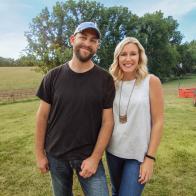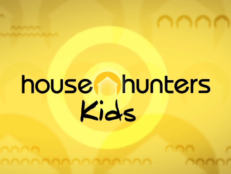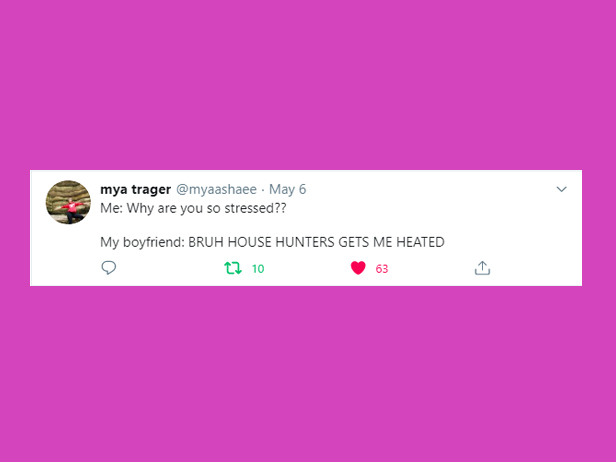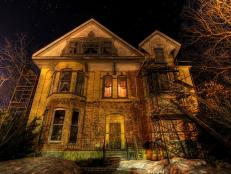'House Hunters' Throwback: How HGTV's Most Iconic Show Began
Original producers Jennifer Davidson and Tara Sandler look back at how HGTV's most iconic show has changed and where it's going.

Producers Jennifer Davidson and Tara Sandler never imagined an idea sparked by their very own house hunting ordeal would become HGTV's longest-running show, spanning 24 years, 243 seasons, at least 16 spinoffs and no end in sight. Launched on Sept. 30, 1999, House Hunters is widely beloved and firmly established in the cultural zeitgeist.
Origin Story
Of course, it all started with the hunt for a home.
Partners in real life, Jennifer and Tara were searching for their next house in Los Angeles in 1998 and quickly realized their budget would not be enough to secure their dream home. They'd toured at least 15 spaces before the proverbial light bulb switched on. Jennifer explains, “We’re at this particular house in Studio City that had a really odd layout, but it had this gorgeous outdoor space with a big pool.” Tara elaborates, "We're agonizing, going, well, the outdoor area is great but the indoor area is not so great, but we could fix that. But how much is that gonna cost?" In that moment they looked at each other and realized they had a potential show.
No strangers to TV production, Jennifer and Tara had already produced some popular shows, including TLC's A Baby Story. That premise, which followed a couple during the final weeks of pregnancy and the first weeks of the new arrival, became the same basis for House Hunters. They realized the success of their prior shows hinged on an expectation: e.g., a baby being born, or in this case, purchasing a home. They returned to their office, submitted an offer on the house and faxed over a one-paragraph pitch of the show to the head of programming. It got an immediate greenlight, and a pop culture phenomenon began.

Jennifer Davidson (left) and Tara Sandler (right), creators of House Hunters. (Photo courtsey of Jennifer and Tara.)
Early Years
It took some time for House Hunters to find its winning formula and become a hit. Early seasons centered around whether or not an offer was accepted, instead of which house was chosen. And money was still a taboo subject, so forget any mention of budget. The stakes didn't feel as high. The show often featured more than three homes, but instead of waiting for the end for the big reveal, the potential buyers eliminated their options as they went. Also missing? Major drama, as buyers were usually in agreement about their wish list. Opinions tended to be polite and subdued. Even the theme song was different, evocative of another huge network hit at the time.
Those who tuned in from the beginning will also remember on-air host Suzanne Whang, who cheerfully guided viewers through each episode. And the locations? Due to budget constraints, the early years were limited to Southern California (although locations weren't mentioned back then), and nobody could blame viewers if all of the houses started to look alike.
The House Hunters we know today didn't crystallize until the show's eighth season. Home locations extended beyond California, editors tightened up plotlines (so long realistic-but-snoozy scenes of counteroffers and walk-throughs) and producers invited viewers to guess the chosen house. Tara credits the "game show" aspect of the new format to the couple's earlier show, Designers’ Challenge, where homeowners chose their favorite renovation plan from three design options.
Tara remembers, "One day, Jennifer said, ‘Why don't we ask [the audience] which home [the buyers] choose instead of telling them?’" According to the couple, this element added a new level of interest to the show, as well as gave viewers incentive to watch until the end.
"We still play 'the game'," says Tara. (She's referring to when viewers try to guess which home buyers will choose.) This game has also spawned fan theories. For example, some fans believe realtors will wear their best outfits while showing the "winning" house. True or not, it certainly adds a new dimension to the House Hunters viewing experience.
There have been other changes, too. Longtime viewers might have noticed there hasn't been an on-air host since 2007, but narration, currently voiced by Andromeda Dunker, remains. Other changes include ditching last names and adding professions — the latter becoming an enduring meme. Speaking of jobs: Buyers now discuss their budgets — which Tara estimates happened around the housing boom. "I think people started talking about money in a way they never had before," she shares. "It used to be faux pas to say how much you spent on your house."
Challenges
It’s impossible to discuss House Hunters’ evolution without touching on the 2008 housing crisis, the 2020 global pandemic and the current market slowdown. Ironically, the spiraling housing market didn’t affect the show’s popularity. In 2008, the New York Times reported the network actually doubled its orders of House Hunters in 2007. The 2020 COVID-19 pandemic has been the only time production halted, pausing for a few months because of the traveling nature of the show. “What was amazing to us is that people still wanted to go on the show,” Jennifer recalls. More subtle changes — for example, the buyers following an agent in their own car versus a shared car — reflected the reality of the situation for many.
Even today’s limited inventory and high prices haven’t stopped would-be participants from applying to be on the show, but buyers’ expectations have shifted. Dan Kilkenny, an associate producer on House Hunters, explains, “The storytelling … is a little more tense at times because people are making sacrifices they didn't want to make,” he shares. ”They have to expand their budgets a little bit more,” he adds, acknowledging, “We're seeing it's tougher for first-time home buyers.”
It’s no coincidence that recent episodes now display the cost for fixer-upper projects during home tours — from gutting a kitchen to stripping plaster off of walls — because more homeowners are willing to put in the work to get into today's market.
Diversity
Speaking of current filming, Dan credits Jennifer and Tara for fighting to showcase diverse home buyers from the very beginning of House Hunters. “It was important to see people like us portrayed on TV,” Tara says, "along with people from a wide variety of backgrounds."
Dan continues to push forward with telling diverse stories. Recent seasons feature people of color, members of the LGBTQ community, those with disabilities and buyers who represent a wide range of budgets.
Jennifer remembers back when the show was more sanitized and featured only happy stories, avoiding words such as “divorce,” “toilet” and “cramped.” She continues, “Initially the way the network described the show was a ‘happy little bedtime story.’”
She pinpoints the changing nature of reality TV with viewers accepting different stories and different kinds of lived experiences. Recent years have featured a couple in the midst of a divorce (with the soon-to-be ex acting as the realtor), and a throuple house hunting in Colorado.
Technology
While many of the aforementioned changes were intentional, technology’s rapid evolution since House Hunters’ inception unintentionally changed the way people look for houses and how the process is now depicted. Long gone are the days of prospective buyers driving past a "for sale" sign and stopping to grab a flier or circling ads in a newspaper’s real estate section. Also long gone is the show’s invitation for viewers to send a snail mail letter with questions or comments to a physical address. Now we even see potential house buyers participating in virtual viewings.
A Cultural Phenomenon
Technology hasn’t just changed house hunting but the way viewers enjoy the show. There are now dedicated social media fan accounts — such as @househunters_screens on Instagram, where 23.5K followers enjoy memes from the show. Saturday Night Live parodied House Hunters in 2018, with Leslie Jones and Liev Schreiber considering an invisible house, among others. (Spoiler alert: They chose the one with the stove on the bed and Pete Davidson living in the basement.) Then there was the Funny or Die episode with Jerry O'Connell and Rebecca Romijn seeking the haunted house of their nightmares.
Despite House Hunters’ early success, Jennifer and Tara never imagined the show would become the network’s most enduring. Tara partially attributes its longevity to buyers’ stories. “Everyone's house hunt is going to be different, because everyone's interpersonal relationships are different. I think this is why you can see thousands of episodes of House Hunters and no two episodes are going to be the same.”
Jennifer and Tara agree the non-threatening premise and game show aspect also help retain viewers, including those who have watched from the beginning.
Spinoffs
This level of insatiable demand has resulted in 16 spinoffs. House Hunters International came first in 2006, followed by a wide assortment through the years, such as Island Hunters, House Hunters Renovation and Tiny House Hunters. There’s even a House Hunters: Comedians on Couches that debuted in 2020, featuring famous comedians ad-libbing commentary while watching episodes.

Future
So what’s in store for the show? “If it ain't broke, don't fix it,” says Dan, regarding the formula. (Although he acknowledges the memes about unrealistic jobs and sky-high budgets have somewhat changed who's featured.)
“'I'm a salamander farmer and I'm a stay-at-home mom and our budget is $1.5 million … 'It's funny to be in the zeitgeist like that, but that was a wake-up call where we needed to make sure that we [feature] relatable jobs, relatable budgets,” he says. Though, he won’t shy away from featuring a salamander farmer. “Let's shine a microscope on that. What does a salamander farmer look like in his day-to-day life? What kind of house does a salamander farmer need?”
Tara and Jennifer hope viewers will still relate to buyers of all backgrounds as House Hunters continues to stretch the bounds of diversity casting.
“[HGTV] is one of those networks that attracts people from all spectrums of life,” says Jennifer. “If House Hunters can keep going and actually help people understand each other — even if they don't look like you — that's a step in the right direction."






















